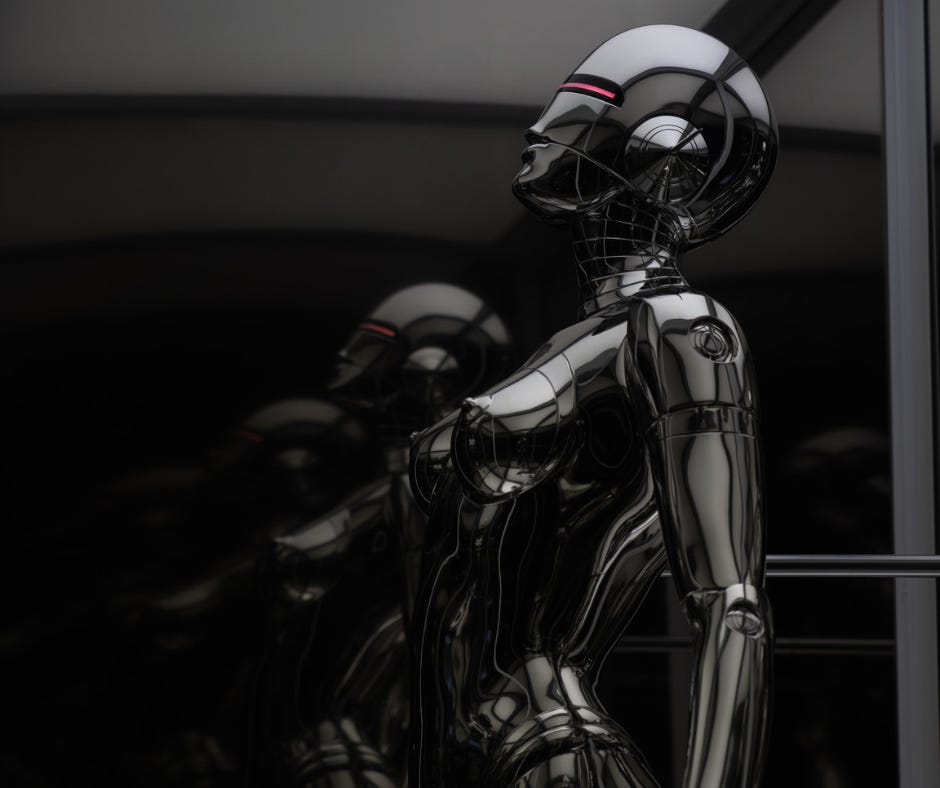Many of our organizational DEI initiatives fail because we fail the Terminator test
If AI could learn to value humanity, humans can choose humanity, too.
Here are two ideas from my book, Reconstructing Inclusion: Making DEI Accessible, Actionable, and Sustainable and other texts I leaned on in writing it. In addition, I’ve included one quote, a book recommendation, and a video or article that has inspired or influenced me and hopefully will resonate with you, too. (That’s ✌🏿+ 💡📚➕).
Pages 53-54
"In the final scene, Connor goes into a monologue just after she has lowered the Terminator, played by Schwarzenegger, into a massive foundry to melt it down at its request via its programming. In the first movie, the Terminator tries to kill Connor and the father of her child. In the second movie, the AI (T-800 for fans) protects Connor, her son, and humans in general. Connor’s message, delivered as she’s driving down a dark highway and the movie moves toward the closing credits, was that if an AI could learn to value humanity, humans could choose humanity, too.
Many of our organizational DEI initiatives fail because we fail the Terminator test.
Rather than structuring our efforts with the superset of humanity in mind, we design them with particular subsets of humanity in mind instead. This is not to say that specific groups don’t need appropriate attention given to their unique circumstances.
But if humanity is a superset and particular identities are its subsets, then focusing on a specific subset instead of emphasizing the breadth of humanity could be limiting even for those who are the intended targets of our approaches.
AI holds the potential to broaden our insights about humanity. If used thoughtfully, it can mitigate harm in various processes and systems where built-in historical biases can be examined and reconsidered with code. AI can help change the narrative.
Conversely, it can also reinforce historical biases that have created inequities. For example, inequities such as ageism in hiring, colorism in recognizing faces in crime prevention video surveillance systems, [healthcare decisions based on cost-benefit to the healthcare system and not those with the greatest need], and decisions about approving loans could be and have been found to influence training data sets and coding that reflects unequal treatment intentionally and unintentionally perpetuated over time.”
Photo by Xu Haiwei on Unsplash
Page 98-99
"What started in late May of 2020 had continued through the year 2021, with protests large and small happening around the world—movements to make police more accountable to communities; to remove monuments commemorating the antebellum South and other colonialist representations around the world; and to challenge companies to go beyond platitudes of support and move headfirst into humanizing action.
Nonetheless, we have not moved beyond the tendency to make “them” wrong.
Many white people [and black people, for that matter] at large have been underinformed about the history of their ancestors and, in many cases, their own roles in perpetuating inequity. When your experience has been considered normative, privilege can be unknowingly and strikingly blinding.
There is no excuse, but there is space for advancing the conversation on how to be accountable in a sustainable way. However, spending a lot of social capital on “othering” or making people wrong will not move organizations toward equity. In fact, it is likely to trigger the opposite.
Holding power accountable is necessary. But, no evidence says organizations would have moved in this direction without the concurrence of events starting in 2020. And, if we look at the recent catastrophes as a chance to create systems and structures that can prevent other similar disasters from happening, and/or if our institutions and communities are strengthened rather than diminished by these tragedies, we create something sustainable beyond typical cosmetic gestures.
Many organizations want to be accountable, and they want inclusion to reflect who they are. But, as well, they want to look good. There is no reason why they cannot have both.
Nonetheless, before they can get on the road to making their brand nice and shiny, they must invest in transforming how business is done. This includes how companies hire, procure, develop, compensate/reward, communicate, contribute to uplifting communities, and much more.
In short, they must look at the entirety of their operation and make systemic changes that reflect equity in their purpose for everyone in the organization, including accounting for a history of disparate outcomes for Black people and other [historically] subordinated groups.
The above is not meant to be and is not corporate social responsibility. Instead, it represents a new way of operating, an approach to organizational life beyond the transactional pacification of dissent.
It’s about building equitable structures for organizational ecosystems.
A pivot from “us” and “them” to:
“We, the architects of this organizational culture, will build our firm with equity in mind. We believe this serves the best interests of all our stakeholders."
💡A Quote
The grand prize in us versus them is that somebody gets to feel special for a while. The grand prize in the game of unity is that everyone gets to feel special forever.
—Deepak Chopra, Fire in the Heart
📚A Book
Photo Credit: Good Reads.com
The Idea of Justice by Amartya Sen
➕A Podcast
The Witch Trials of J.K. Rowling
You may have canceled Harry Potter or burned the books you own in the series. Or, you have simply canceled the author while still being profoundly moved, to this day, by what the books brought to your life.
Or, you still love J.K. Rowling and all the characters you fell in love with as you read the books from cover to cover, over and over.
Whatever the case, this podcast will give you something to think about and talk about.
And, whatever your opinion, I hope it leaves room for care, openness, safety, and trust to be explored through dialogue about a very sensitive and, for many, hard-to-grasp and complex topic.
I hope this was helpful. . . Make it a great day! ✌🏿







